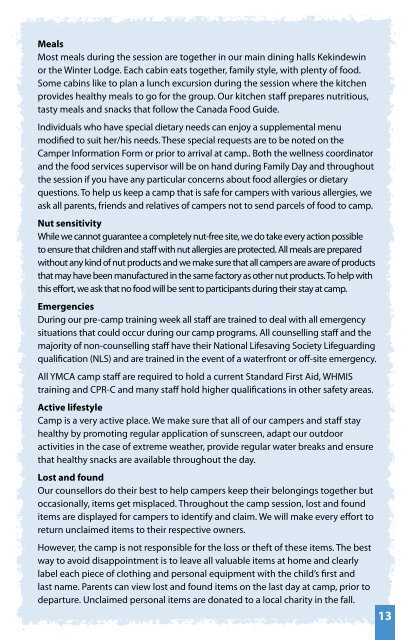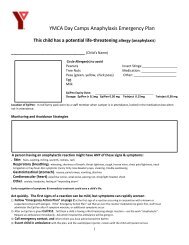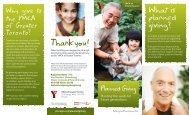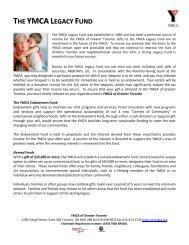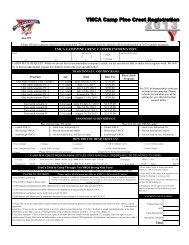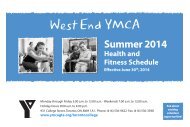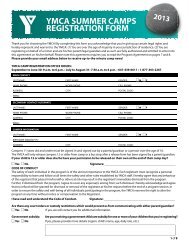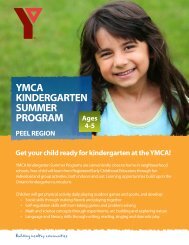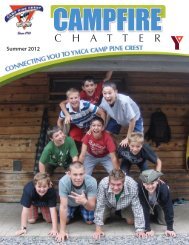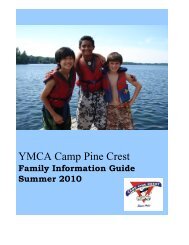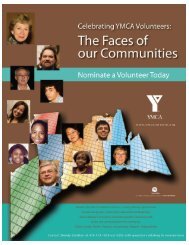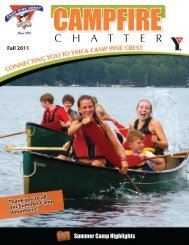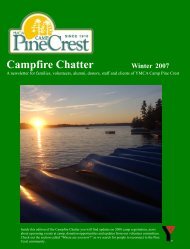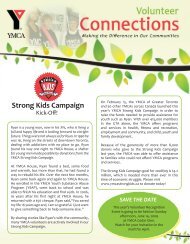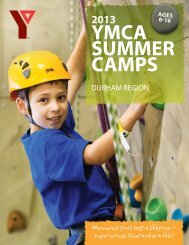2013 Summer Camp Welcome Guide - YMCA of Greater Toronto
2013 Summer Camp Welcome Guide - YMCA of Greater Toronto
2013 Summer Camp Welcome Guide - YMCA of Greater Toronto
- No tags were found...
Create successful ePaper yourself
Turn your PDF publications into a flip-book with our unique Google optimized e-Paper software.
MealsMost meals during the session are together in our main dining halls Kekindewinor the Winter Lodge. Each cabin eats together, family style, with plenty <strong>of</strong> food.Some cabins like to plan a lunch excursion during the session where the kitchenprovides healthy meals to go for the group. Our kitchen staff prepares nutritious,tasty meals and snacks that follow the Canada Food <strong>Guide</strong>.Individuals who have special dietary needs can enjoy a supplemental menumodified to suit her/his needs. These special requests are to be noted on the<strong>Camp</strong>er Information Form or prior to arrival at camp.. Both the wellness coordinatorand the food services supervisor will be on hand during Family Day and throughoutthe session if you have any particular concerns about food allergies or dietaryquestions. To help us keep a camp that is safe for campers with various allergies, weask all parents, friends and relatives <strong>of</strong> campers not to send parcels <strong>of</strong> food to camp.Nut sensitivityWhile we cannot guarantee a completely nut-free site, we do take every action possibleto ensure that children and staff with nut allergies are protected. All meals are preparedwithout any kind <strong>of</strong> nut products and we make sure that all campers are aware <strong>of</strong> productsthat may have been manufactured in the same factory as other nut products. To help withthis effort, we ask that no food will be sent to participants during their stay at camp.EmergenciesDuring our pre-camp training week all staff are trained to deal with all emergencysituations that could occur during our camp programs. All counselling staff and themajority <strong>of</strong> non-counselling staff have their National Lifesaving Society Lifeguardingqualification (NLS) and are trained in the event <strong>of</strong> a waterfront or <strong>of</strong>f-site emergency.All <strong>YMCA</strong> camp staff are required to hold a current Standard First Aid, WHMIStraining and CPR-C and many staff hold higher qualifications in other safety areas.Active lifestyle<strong>Camp</strong> is a very active place. We make sure that all <strong>of</strong> our campers and staff stayhealthy by promoting regular application <strong>of</strong> sunscreen, adapt our outdooractivities in the case <strong>of</strong> extreme weather, provide regular water breaks and ensurethat healthy snacks are available throughout the day.Lost and foundOur counsellors do their best to help campers keep their belongings together butoccasionally, items get misplaced. Throughout the camp session, lost and founditems are displayed for campers to identify and claim. We will make every effort toreturn unclaimed items to their respective owners.However, the camp is not responsible for the loss or theft <strong>of</strong> these items. The bestway to avoid disappointment is to leave all valuable items at home and clearlylabel each piece <strong>of</strong> clothing and personal equipment with the child’s first andlast name. Parents can view lost and found items on the last day at camp, prior todeparture. Unclaimed personal items are donated to a local charity in the fall.13


